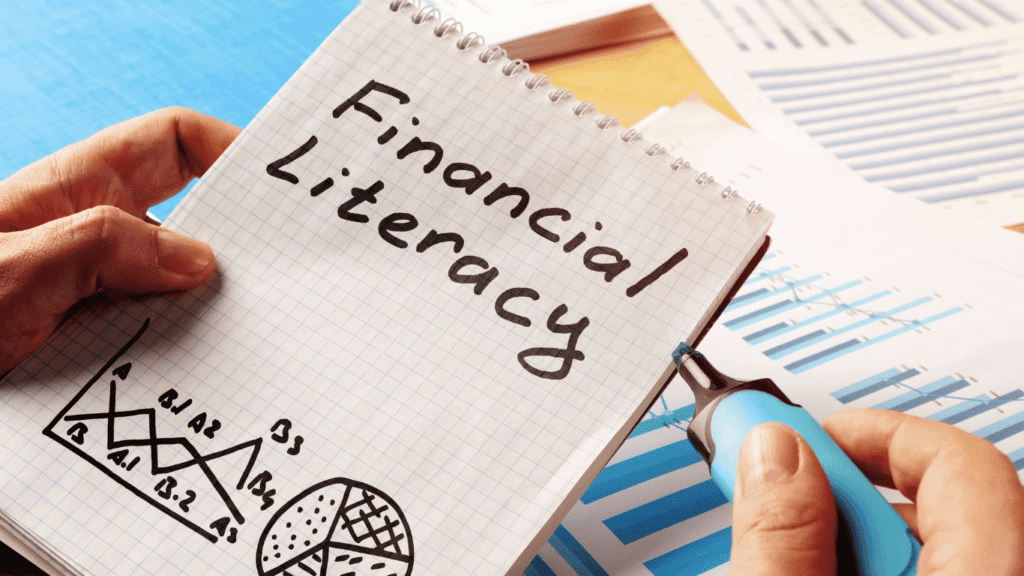Imagine kicking off your day with a morning jog, feeling the fresh breeze on your face as you set a strong pace. Now, what if you could give your finances the same robust start? “Start Young, Stay Strong: Early Steps to Financial Fitness” is your guide to doing just that—giving your wallet a workout that pays off in spades down the road.
Let’s face it, we often think we’ve got all the time in the world, but when it comes to money, starting early is like planting an oak tree—the sooner you do it, the more shade you’ll have to enjoy later on. This piece isn’t just a bunch of numbers and charts; it’s a treasure map that leads you to the gold of good habits, savvy saving, and investment smarts.
From piggy banks to stock markets, it’s a wild ride, but hey, who doesn’t enjoy a good thrill? And the best part? You don’t need to be a Wall Street whiz. So, roll up your sleeves, and let’s dive in. We’re about to turn pennies into fortunes, one smart step at a time. Buckle up, buttercup, we’re in for an exciting journey to financial fitness.
- Introduction
- What is Financial Fitness?
- Benefits of Starting Young
- The Power of Saving
- Developing Good Spending Habits
- The Role of Budgeting
- Learning about Investing
- Understanding Credit
- Setting Financial Goals
- Teaching Kids about Money
- Building an Emergency Fund
- Avoiding Debt
- Insurance and Protection
- Planning for Retirement
- Growing Your Wealth
- The Role of Education and Knowledge
- Resources for Financial Education
- Frequently Asked Questions (FAQs)
- Conclusion
Start Young, Stay Strong: Early Steps to Financial Fitness
Introduction
Financial fitness is essential for a secure and stable future. By starting young and taking early steps towards financial fitness, you can set yourself up for long-term success. In this article, we will explore the importance of starting early, the power of saving, developing good spending habits, and various other strategies to achieve financial fitness. Let’s dive in and learn how to start young and stay strong on the path to financial success.
What is Financial Fitness?
Financial fitness refers to the state of being financially healthy and secure. It encompasses the prudent management of your finances, making well-informed choices about money, and preparing for what lies ahead. Just like physical fitness, financial fitness requires discipline, commitment, and regular exercise of good financial habits. By maintaining financial fitness, you can achieve long-term financial stability, enjoy a comfortable lifestyle, and have the freedom to pursue your goals and dreams.

Start Young, Stay Strong: Early Steps to Financial Fitness
Starting young is one of the key factors in achieving financial fitness. The earlier you start, the more time you have to build wealth, save for retirement, and weather financial storms. Here are some early steps you can take to start young and stay strong in your financial journey:
Benefits of Starting Young
Starting young offers several benefits when it comes to financial fitness. Firstly, it allows for longer-term investment growth, as you have more time to ride out market fluctuations. Additionally, starting young helps develop good financial habits early on, such as saving and budgeting. By starting early, you can establish a solid foundation for your financial future and set yourself up for long-term success.
The Power of Saving
Saving money is a crucial aspect of financial fitness. It allows you to build an emergency fund, save for future expenses, and invest for long-term goals. By starting young and making saving a habit, you can harness the power of compounding interest and watch your savings grow over time. Whether it’s setting aside a percentage of your income or automating your savings, find a strategy that works best for you and make saving a priority.
Developing Good Spending Habits
Developing good spending habits is essential in maintaining financial fitness. It’s important to differentiate between needs and wants and make responsible spending decisions. Avoid impulsive purchases and practice delayed gratification. Consider creating a budget to track your expenses and ensure that your spending aligns with your financial goals. By developing good spending habits early on, you can avoid unnecessary debt and make smarter financial choices.

The Role of Budgeting
Budgeting plays a vital role in financial fitness. It involves tracking your income and expenses, setting financial goals, and allocating funds accordingly. Creating a budget allows you to prioritize your spending, identify areas where you can cut back, and save for future expenses. By sticking to a budget, you can gain control over your finances, reduce financial stress, and work towards achieving your long-term financial goals.
Learning about Investing
Investing is a powerful tool for accumulating wealth and improving your financial well-being. It involves putting your money to work on assets that have the potential to grow over time. As a young investor, it’s important to educate yourself about different investment options, such as stocks, bonds, and mutual funds. Consider seeking guidance from a financial advisor and start with low-risk investments to minimize potential losses. By starting young and investing wisely, you can build a strong financial foundation for the future.
Understanding Credit
Credit plays a significant role in financial fitness, especially when it comes to major purchases like a home or car. Building a good credit history from a young age is essential. Practice timely bill payments, maintain modest credit usage, and steer clear of needless financial obligations. By maintaining a good credit score, you can qualify for favorable interest rates, secure loans, and have more financial flexibility.
Setting Financial Goals
Setting and achieving financial goals is an important aspect of financial fitness. Start by identifying your short-term and long-term financial aspirations. Whether it’s saving for a down payment on a house, paying off student loans, or starting a retirement fund, having clear goals can provide direction and motivation. Break down your goals into smaller, achievable tasks, and monitor your progress consistently. By setting financial goals early on, you can stay focused and work towards achieving them.
Teaching Kids about Money
Financial fitness starts with education, and it’s never too early to start teaching children about money. Teach them about the value of money, the importance of saving, and the concept of budgeting. Encourage them to earn money through chores or small jobs and guide them in making smart spending decisions. By instilling good financial habits in your children from a young age, you empower them to make informed financial choices in the future.
Building an Emergency Fund
Building an emergency fund is a crucial step in achieving financial fitness. Unexpected twists and turns are a natural part of life, and financial surprises can crop up without warning. By setting aside a portion of your income in an emergency fund, you can protect yourself from financial setbacks and ensure peace of mind. Aim to save three to six months’ worth of living expenses and make regular contributions to your emergency fund. Starting young allows you to gradually build your fund over time and be prepared for any financial surprises.
Avoiding Debt
One of the major obstacles to financial fitness is debt. Avoiding unnecessary debt and managing existing debt is crucial for maintaining financial stability. Prioritize paying off high-interest debts, such as credit card balances, and avoid accumulating new debt whenever possible. Practice responsible borrowing and only take on debt for necessary investments, such as education or a home. By avoiding debt and managing it wisely, you can maintain a healthy financial position.
Insurance and Protection
Insurance is an essential component of financial fitness. It provides protection against unexpected events, such as accidents, illnesses, or property damage. Evaluate your insurance needs and ensure you have adequate coverage for health, auto, home, and other valuable assets. While insurance may involve upfront costs, it can save you from financial ruin in the event of an unforeseen circumstance.
Planning for Retirement
Planning for retirement is a critical aspect of financial fitness. Starting to save for retirement sooner gives your money more time to grow. Consider opening an Individual Retirement Account (IRA) or participating in an employer-sponsored retirement plan, such as a 401(k). Contribute regularly to your retirement fund and take advantage of any employer-matching contributions. By starting young and planning for retirement, you can enjoy a comfortable and financially secure future.
Growing Your Wealth
Growing your wealth is a long-term goal of financial fitness. In addition to saving and investing, explore other avenues for wealth accumulation. Consider diversifying your investments, exploring real estate opportunities, or starting a side business. Continuously educate yourself about personal finance and wealth-building strategies. By being proactive and open to opportunities, you can grow your wealth over time and achieve financial independence.

The Role of Education and Knowledge
Education and knowledge play a crucial role in achieving and maintaining financial fitness. Stay informed about personal finance topics, such as budgeting, investing, and tax planning. Read books, attend seminars, and take online courses to expand your financial knowledge. By continuously learning and staying up to date with financial trends, you can make informed decisions and adapt to changing economic conditions.
Resources for Financial Education
There are numerous resources available for individuals seeking to enhance their financial education. Websites such as Investopedia, The Balance, and NerdWallet offer valuable information and resources on various financial topics. Books like “Rich Dad Poor Dad” by Robert Kiyosaki and “The Total Money Makeover” by Dave Ramsey provide insights and strategies for financial success. Additionally, there are online courses and workshops available that can further deepen your understanding of personal finance.
Frequently Asked Questions (FAQs)
How important is it to start young when it comes to financial fitness?
Starting young is crucial for financial fitness as it allows for long-term wealth accumulation and the development of good financial habits.
What are the benefits of saving money from a young age?
Saving money from a young age allows for the power of compounding interest and helps build an emergency fund and save for future expenses.
How can I develop good spending habits?
Developing good spending habits involves differentiating between needs and wants, practicing delayed gratification, and creating and sticking to a budget.
Why is credit important for financial fitness?
Credit is important for major purchases and financial flexibility. Building a good credit history from a young age can lead to favorable interest rates and more opportunities.
How do I set and achieve financial goals?
Setting financial goals involves identifying aspirations, breaking them down into actionable steps, and tracking progress regularly.
How can I teach my children about money?
Teach your children about the value of money, and the importance of saving, and guide them in making smart spending decisions.
Conclusion
Achieving financial fitness requires discipline, commitment, and a proactive approach. By starting young and taking early steps toward financial fitness, you can build a solid foundation for your future. Explore the power of saving, develop good spending habits, understand credit, and set financial goals.
Remember to continuously educate yourself about personal finance and take advantage of available resources. Start young, stay strong, and embark on the path to financial success.






 Get it on
Get it on  Download on the
Download on the